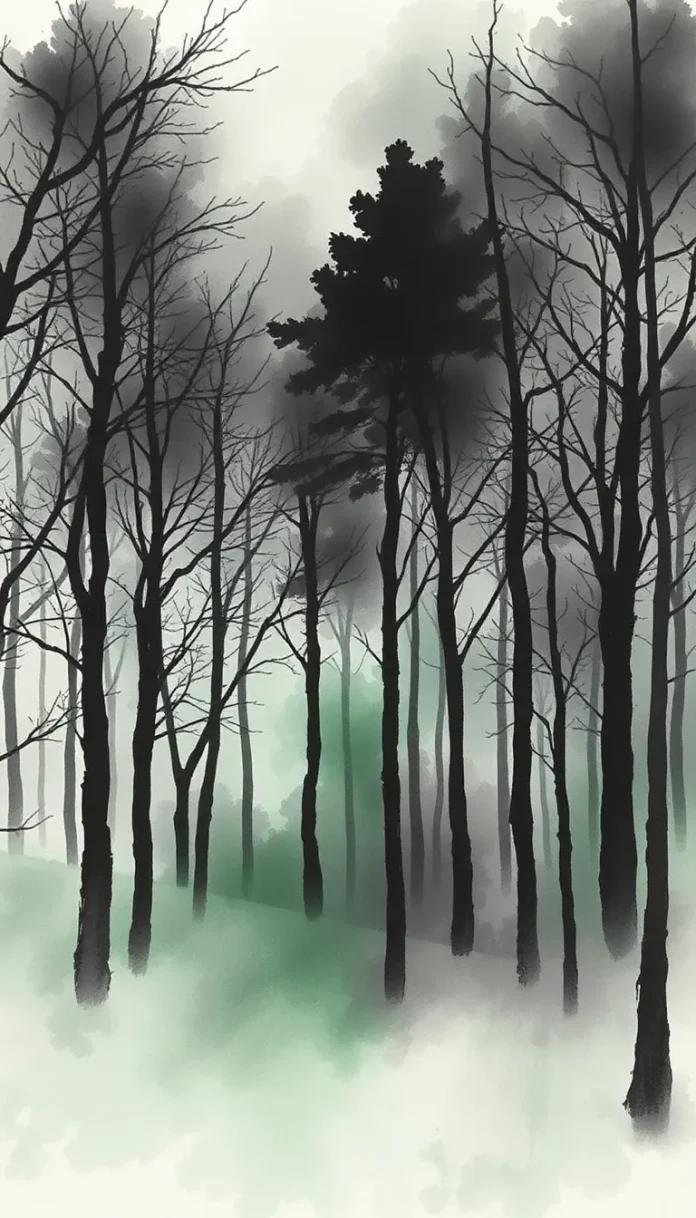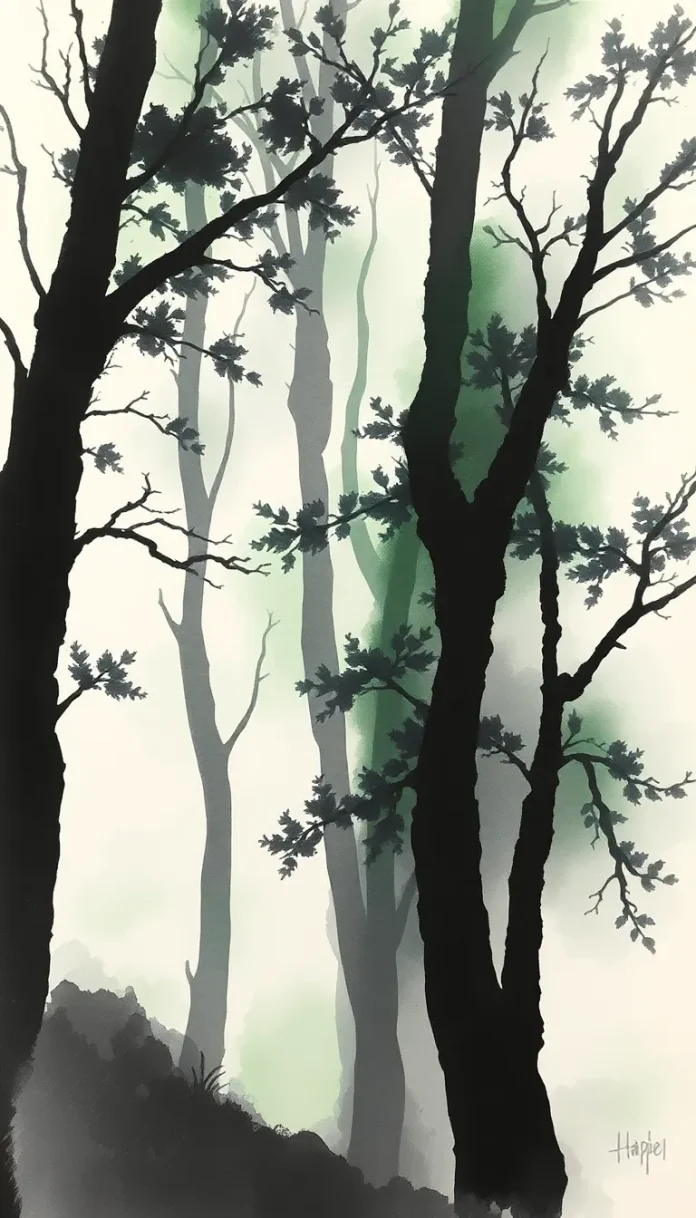Ashen Whispers by the Seaside
Beneath the quivering glow of a timid sunrise, he beheld the watery expanse: a mirror unto his spirit, vast and unfathomable. “O shadow of myself,” he murmured softly, his voice carried away by the sighing brume, “what secrets do you conceal in your depths? Mayhap within thee lies the truth for which I ardently quest.” Thus, with eyes reflecting both hope and profound melancholia, he ventured where the sea kissed the land, his heart betokening incalculable enigmas.
As the fog-laden morning unfolded with spectral elegance, the wanderer recalled the vestiges of his past—a litany of unfulfilled dreams and scattered memories. In the quiet solitude of his inner being, the silent monologue surged forth, weaving allegories of loss and of rebirth. “I am adrift in the autumn of my life,” he confided in an unseen listener, “an exile astray in a world of shifting sands. Am I not, like this transient mist, ephemeral and yearning for a form that might someday be my own?”
The sea, a vast repository of time’s secrets, echoed back his inquiry with rhythmic lapping along the shore; its gentle cadence served as both counsel and riddle. An ancient lighthouse, its silhouette blurred by the heavy air, stood as sentinel to these contemplations. The wanderer approached its timeworn steps, each stone seeming to carry a whisper of bygone travelers. Amid these silent guardian walls, the dialogue of memory and longing resurrected a thousand-year-old melancholy.
In a dignified tone, he addressed the venerable monolith as though it were an old confidant: “Tell me, wise beacon, what phantom truths linger amidst the resplendent melancholy of dawn? What say you of the uncharted realms that lie both within and without?” The lighthouse, in its silent majesty, answered not with words but with the stirring of its beam—a glint that ignited the imagination, conjuring phantasmal specters of identity lost and found.
Thus ensconced in reflective solitude, the wanderer embarked upon a meditative journey down a clifftop path. Twisting and turning, the pathway undulated like the uncertain rhythm of an errant heartbeat. Along the way, wild heathers bowed gracefully to the gentle touch of the saline breeze, their purple petals reminiscent of scattered thoughts. Beneath the shroud of the mystical morning, nature herself became a counsel in sonorous tones—a living allegory for his inner disquiet, and a constant reminder of the ephemeral nature of existence.
Passing through groves of windswept pines and sequestered dunes, the Nomade encountered a weathered figure clad in solitude: an aged mariner who, like him, had found refuge on this lonely frontier of dawn. Their eyes met, each a pair of kindred spirits adrift in a vast world unknown. In measured cadence, the mariner spoke: “I too have wandered these ghostly lands, a pilgrim seeking solace in the secrets of the shifting tides. Each day, the sea unveils a new parable of existence, yet its verses leave me in a constant state of longing. Tell me, fellow seeker, do you not find in this solitude an echo of your own heart’s cry?”
The wanderer paused, his gaze drifting over the interminable horizon where the water and sky converged in a phantasmagoric dance. “Indeed,” he replied in tones that resonated with both wistfulness and hope, “the endless murmurs of the ocean mirror my unspoken yearning. The quest for identity is akin to navigating a labyrinth of illusions—each turn reveals another facet of the self, yet none grant the final solace I so dread and yet so fervently desire.” Their voices, soft as the press of the tide, mingled with the calls of distant seabirds, forming an impromptu choir of elegiac wisdom.
Then, as if summoned by the lingering accord of their souls, the aged mariner receded into the mist, leaving behind an indelible memory and a cryptic smile. Left once more in solitary contemplation, the wanderer resumed his journey along the edge of the water. His thoughts, now an intricate tapestry of metaphors, wove images of shipwrecked hopes and rekindled dreams. “Perhaps,” he mused internally, “my raft upon the turbulent sea of destiny shall eventually find harbor in an undiscovered cove of clarity, or perhaps I too shall vanish as silently as the morning fog.”
In such reverie, every element of the seascape assumed symbolic weight. The unyielding cliffs signified the immutable boundaries of fate, while the delicate foam atop the waves hinted at ephemeral truths too fleeting to be grasped. The interplay of light and shadow sculpted a chiaroscuro tableau, in which the dual nature of hope and despair found a silent communion. The wanderer’s existence—at once isolated yet intrinsically intertwined with the eternal rhythms of nature—became a living allegory for the ceaseless pursuit of inner verity.
The journey advanced beneath an ever-changing sky; the morning matured and the veil of mist gave way to hints of ember glows, as though the horizon itself had kindled a secret flame. Along his path, the Nomade encountered relics and symbols of forgotten eras—weather-beaten inscriptions on stone, remnants of abandoned mariners’ quarters, traces of lost artifice in an indifferent clime. Each vestige was a silent testament to lives once lived in search of meaning, and in their decay, the wanderer discerned an inevitable truth: all mortal endeavors, no matter how fervent, are transient ripples on the infinite sea of time.
As the sun ascended, scattering its golden motes across the water, the wanderer rested beside a tidepool brimming with reflective solitude. In its mirror-like surface, he glimpsed a reconstruction of his visage, a palimpsest of years etched in resolve and regret. “Who am I?” he questioned into the quiet ether, his voice a mere breath melding with the whispers of the tide. Within that limpid basin, nature’s arcane artistry coaxed forth an inner dialogue—a cascade of recollections both tender and unyielding.
He remembered a day in a faraway land, a moment when the heavens had wept with such intensity of sorrow and clarity that every droplet had inscribed a verse of his being. “I wandered then, too, like this ceaseless tide,” he recounted silently, his thoughts meandering between memory and the endless present, “searching for an identity as elusive as the fading mists of this dawn.” The tidepool’s shimmering surface, as if amused by his introspection, rippled with indefinite promise—a subtle hymn to the eternal quest for truth that animated all existence.
In that quiet interlude, the wanderer sat upon a slab of time-worn stone, letting his spirit commune with the ambient music of the sea. An inner monologue unfurled like scrolls of ancient lore, rich with metaphoric elegance and profound symbolism. “In solitude,” he mused, “I confront the myriad faces of my being. Each ephemeral aspect of my soul mirrors the twilight divisions of day and night—a collision of gloom and resplendence in a perpetual duel for essence. And yet, what is identity but the sum of these contradictions, a riddle woven by the hand of time itself?”
The conversation with his internal self was interrupted by the gentle call of the wind, laden with the salt and grace of the old sea. It carried with it a murmur from afar—a beckoning that was at once vague and meaningful. The ambient dialect of nature whispered of lands yet unseen, of truths waiting on the far side of existence’s horizon. This susurration of possibility stirred the wanderer to rise and once more traverse the shifting sands. “The quest, it seems, is as inexorable as the tide’s embrace,” he intoned softly, embracing the duality of hope and uncertainty that lay before him.
Stepping forth, he journeyed further along the rugged path that skirted the sea, where the elements conspired to form a labyrinth of reflections. Here, the interplay of light and shade rendered the world both surreal and achingly real, each detail a brushstroke in a grander fresco of existence. The air was redolent with the aroma of brine and ancient wood—a scent that evoked both reminiscence and anticipation. It was as if the ethereal morning, ever mutable, bore the banners of myriad fates, each awaiting discovery by the intrepid soul.
Along these winding lanes, Nature herself seemed to converse with him. He listened intently to the rustling leaves, the murmur of distant waterfalls hidden within rocky alcoves, and even to the silence of the stones that had witnessed the slow march of centuries. “Behold,” he whispered tenderly, “the world speaks in its own timeless tongue, each sound a sonnet to the transient beauty of self. I, too, am but a verse in this vast poem—a fleeting note in the symphony of existence.”
The journey then drew him to a secluded cove cradled by ancient granite, where the arena of sea and rock merged in a dramatic tableau. Here, amidst the interplay of crashing waves and resolute cliffs, the wanderer encountered another solitary figure—a young poet, absorbed in the art of inscribing verse upon fragments of driftwood. Their eyes met, and in that brief moment, a silent communion ensued, born of mutual affinity for the elusive nature of truth. The poet, with a voice soft as the whispering winds, spoke: “In the architecture of solitude, each soul fashions its own temple to truth. May you discover therein the sacred geometry of your identity, for the journey is as profound as the destination.”
Their words mingled with the ambient symphony of the sea, and the wanderer responded with heartfelt candor, “Your verse reanimates the weary heart of one who traverses the labyrinths of introspection. I, too, seek to unlock the quiet enigmas embedded within me—a treasure chest of candor and self, buried beneath layers of solitude and inexorable time.” The dialogue, rich with poetic allure, transcended the mere exchange of words; it became a fleeting yet eternal communion between kindred spirits, each bound by the ineffable longing to know oneself in a world unbound by certainty.
For a time, in the embrace of that secluded cove, both travelers allowed themselves to revel in the poetic interlude, their voices harmonizing with the sea’s eternal cadence. Then, as if guided by an unspoken decree, the poet gathered his scattered verses and departed along a hidden path, leaving the wanderer to bask in a reflective silence. “Perhaps,” he wondered softly, “our fates intertwine only briefly, like droplets merging into the vast ocean, only to reemerge in new constellations of being.”
The wanderer resumed his solitary sojourn with renewed determination, though his inner heart remained a crucible of paradoxical fervor—a mingling of desire and resignation, hope and doubt. Each step was a testament to the enduring quest, every stone a silent witness to the odyssey of identity. The seascape, imbued with both the malady of isolation and the promise of discovery, offered no definitive answers but shared instead a mosaic of transient insights. The horizon, ever distant and elusive, beckoned him onward—a final, open invitation to traverse the perilous terrain of self-realization.
As dusk began to coalesce with the remnants of day, the wanderer found himself on a solitary promontory overlooking the vast, unfurled sea. The mellifluous glow of twilight caressed the land, and the interplay of light and dark rekindled within him the eternal song of existence. In this liminal space, where the boundaries between dream and reality melted away, he stood transfixed by the sea’s endless narrative, which whispered both a farewell and a promise. “Here,” he murmured in a tone thick with resigned beauty, “the truth is not to be grasped fully, but to be beheld in fragments—each a mirror reflecting the unquenchable light of the human spirit.”
In that quiet moment, the elements conspired in an enigmatic dialogue—a dialogue wherein the roiling sea, the steadfast cliffs, and the shrouded heavens conspired to defy the mortal constraints of conclusion. The wanderer, his heart a vessel brimming with the bittersweet echo of all his experiences, felt an intrinsic kinship with the timeless vastness before him. “I am adrift yet forever anchored,” he conveyed in the silent soliloquy of his soul, “an artist of my own essence, painting in hues of solitude and luminous dawn, ever chasing a truth that remains as open as the endless horizon.”
The final strains of the day, like the concluding notes of an orchestral masterpiece, receded gently into the embrace of a night yet unspoken. The wanderer, in the contemplative glow of twilight’s parting whisper, resolved that his journey was not to culminate in a final destination but to persist as a perpetual quest, an ever-unfolding narrative of the soul. In the interplay of solitude and boundless possibility, he recognized that his odyssey was a living, breathing testament to the nature of being—a quest for identity that would forever remain enshrouded in mystery.
As he turned from the promontory, his silhouette gradually devoured by the encroaching shadows, the wanderer carried with him the essence of that misty, haunted dawn—a memory woven with the delicate threads of hope, melancholy, and the eternal allure of truth. And so, his journey continued along the infinite shore of the human spirit, forever open-ended, forever drenched in the luminous, ashen whispers of a seafog born each new morning.
Thus, in that nebulous limbo of ceaseless transitions, the tale of the Nomade en quête de vérité found neither triumphant closure nor definitive dissolution. His narrative, like the ever-shifting mists and the boundless sea, remains an open canvas—a verse unfinished, an eternal echo of the quiet, resolute longing that defines the very essence of human existence.


